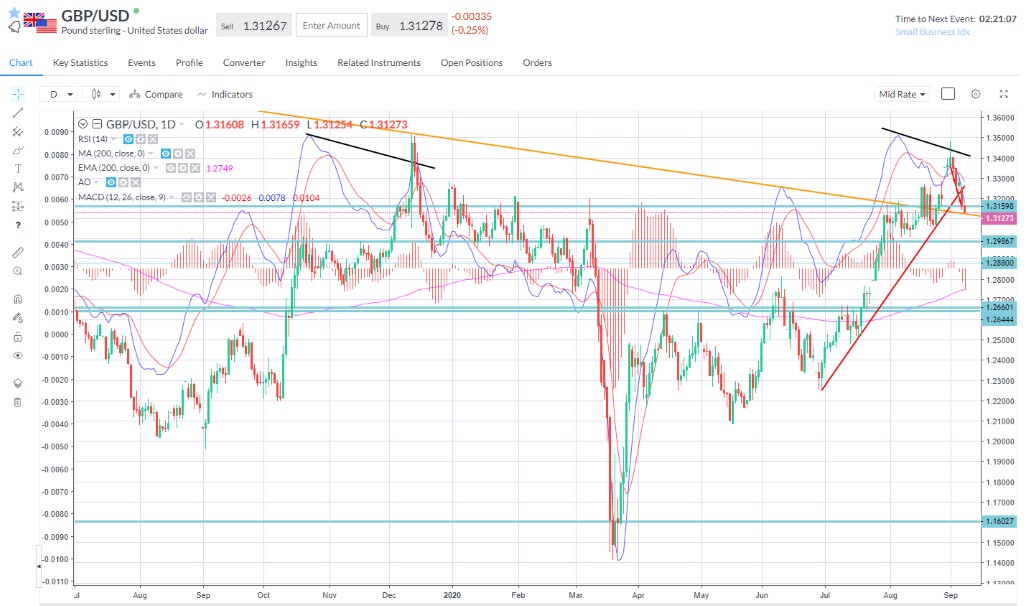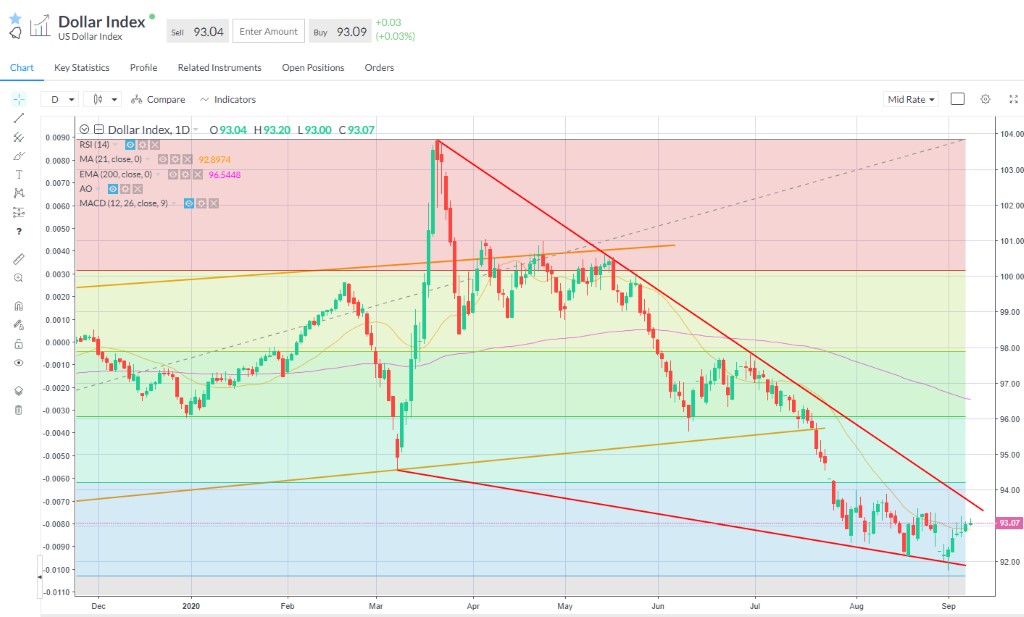Tuesday Sep 8 2020 08:16

6 min
Equity markets are attempting to stabilise after the tech-led sell-off at the end of last week, but the lack of direction from the US on Monday means we are waiting on the Wall Street cash equity open to get a true feel for sentiment. European bourses traded a little lower on Tuesday morning after a strong bump up on Monday.
US futures are a little bit positive, but the Nasdaq was weaker, pointing to ongoing concerns in the tech sector. We need to see whether yesterday’s European rally was something of a free pass thanks to the US holiday and whether there is another tech volatility bleed into the broader market.
Worries about rising case numbers are once again an area of concern. Whilst there is not any appetite for a general lockdown, if cases trend higher we can probably assume at least three things: local restrictions in hotspots, a choppier recovery nationally as a result and the ‘fear factor’ back in play limiting the amount people are willing to go out and about.
Economic indicators seem to be pointing to a slow, uneven recovery and the speed at which things initially bounced back in the summer is not sustainable. There is a loss of momentum which may call for additional central bank and fiscal stimulus.
A choppier economic recovery globally – the W-shape – is not good for oil prices. Saudi Arabia’s decision to discount remains the main driver of sentiment as WTI retreated back under $39, whilst Donald Trump’s comments about ‘decoupling’ from China is another weight.
Whilst it may be too early to call the start of a new trend lower, my inclination is that demand will not come back as quickly as expected and this will force prices lower over the autumn, which may force OPEC+ into further action.
On that note, the capricious quarantine regime makes planning travel tricky enough for us punters, so imagine trying to run an airline in this world. EasyJet says the constantly evolving government restrictions across Europe and quarantine measures in the UK is negatively affecting customer confidence to make travel plans.
In other words, demand is not as good as expected, and management now expect to fly slightly less than the 40% of planned capacity for Q4 2020 which was highlighted at the Q3 trading update. There is no return to normal when there are constantly changing, arbitrary restrictions on our movement. The longer this persists the slower the recovery for airlines and the great number of jobs may be lost. EasyJet shares fell 4%.
One thing is for sure – the parcel business is booming. Royal Mail reported a massive surge in parcel volumes, whilst DS Smith, which makes the cardboard boxes that clog up our recycling bins, says it’s enjoying positive year-on-year growth again. Shares in RMG rose 14%, whilst SMDS was up over 5% on the open.
Royal Mail delivered 177m more packages in the five months to the end of August compared to last year, as parcel volumes rose 34%, with revenues up 33.1% year on year. Addressed letter volumes were down 28% as it delivered 1.1 billion fewer letters. Total revenue was up £139 million but Royal Mail is still set for a significant loss and it warns it cannot become profitable without substantial business change, which is management speak for more job cuts and more automation.
Royal Mail is not fit for the job, but management knows what medicine is required and that is needs administering quickly: ‘Currently, too many parcels are sorted by hand and we are failing to adapt our business to fundamentally lower letter volumes and are holding on to outdated working practices and a delivery structure that no longer meets customer needs.’
Sterling is under pressure on some Brexit-related headlines and is exposed to a further onslaught of negative news as round 8 of the formal negotiations gets underway. Boris Johnson says the withdrawal agreement never made sense and is drawing up legislation to bin parts of it should there be no deal on the table by October 15th.
David Frost and Michel Barnier, the top negotiators on the UK and EU side respectively, have both said the other side needs to get real. Monday’s foreplay got both parties a bit hot under the collar, but the main event starts today.
GBPUSD retreated to 1.3125 this morning to test the weekly multi-year descending trend line. Double rollover on the MACD as occurred in November indicates bearish momentum may build. The euro remains bottled up at the 1.18 level with the ECB meeting ahead on Thursday.
The consensus remains firmly against the USD but it’s notched its highest close above its 21-day moving average since July and the crowded short dollar trade is at risk of reversals. An ECB that could surprise with additional easing this week is another risk to the anti-dollar consensus.


Asset List
View Full ListLatest
View all
Sunday, 27 April 2025

12 min

Sunday, 27 April 2025

6 min

Sunday, 27 April 2025

5 min